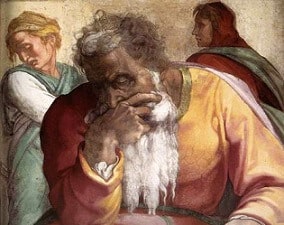Everyday I am confronted with a variety of choices. Will I wear a sweater or a t-shirt? Will I travel to work on the highway or on the side-roads? You get the idea. We make choices all day long, even when they are habitual and do not take any effort. Then there are the choices that require long and prayerful discernment. Will I choose to be married or explore religious life? Will I choose to take that job in another city? How will I choose to care for my parents in their old age? We make decisions throughout our whole lives. Some choices are rather inconsequential and others will have radical consequences on the trajectory of our lives. Life is full of possibility and full of consequences. It is vital that we learn to choose wisely. Our lives – souls – depend on it.
The Epistle to the Romans composed by the apostle Paul between the years AD 56 – 58 explains the doctrine of salvation through faith in Jesus Christ (usccb.org). Scholars know that the epistle was written to a Christian community living in Rome, possibly an offshoot of a settled Jewish community. However, the epistle is universal in it’s message. It addresses Jew and Gentile alike. The message from today’s reading is also universal in its appeal and speaks to everyone about the nature of choice and the reality of the consequences that follow our decisions. While Paul is speaking specifically in Romans 6:19-23 about the choice of finding sanctification through Jesus Christ alone, his understanding of human nature is remarkable.
He wrote,
“For just as you presented the parts of your bodies as slaves to impurity… so now present them as slaves to righteousness for sanctification.”
This alone addresses the primacy of all choice, namely that it arises from within the individual in a process of choice. We are called to take responsibility for our choices in a special way as Catholics. We truly believe that our choices influence the nature of our relationship with God. It is important to clarify that God never stops loving us and desiring for us to love him back, even when we choose impurity over righteousness. God’s love is eternal and he calls out to sinners throughout the New Testament. However, just like if I choose to spend all of my time at work and never spend time with my family, a tension begins to arise of which I am culpable. In any event, it was my choice to act a certain way and that choice had ramifications. As beings created in Imago Dei, that is, in the image of God, we are dignified with this special ability to exercise free will.
Because this ability to choose arises from the soul of our personhood, it is crucial that we learn how to govern our decision-making processes. It has ramifications in our earthly lives, but also in our soul and our souls final destination.
The apostle Paul continued,
“But what profit did you get then from the things of which you are now ashamed? For the end of those things is death. But now that you have been freed from sin and have becomes slaves of God, the benefit that you have leads to sanctification, and its end is eternal life. For the wages of sin is death, but the gift of God is eternal life in Christ Jesus our Lord.”
What we feel, think, say and do matters. We cannot control what happens around us, within our families, neighborhoods, cities or the world. We cannot control all of the feelings and thoughts that enter into our minds. We all have sinned and we will all certainly continue to sin throughout our lives. Yet who will win in the end? As Christians, and especially those who are new to our faith, we would benefit from recognizing our freedom from sin and so move into new ways of living and new possibilities.
One of the facets of Catholicism that attracted me as a convert is what I call it’s “gritty beauty”. The church is not afraid to talk about sin and the darkness. Yet through that discussion of sin, just like during the sacrament of reconciliation, we find our freedom.
Are we choosing to use the gift of the Sacrament of Reconciliation to remember our goodness and free us from the bondage of sin? Are we allowing our hearts to soar in the presence of Christ in the monstrance during adoration or in a quiet morning of prayer?
Paul’s words implore us to look t past the sins in our lives and toward the consequences. They urge us to see the responsibility we have to make wise choices, or not. In the end, we are free to choose. We are dignified and capable of choosing the best. God’s love will knock on our hearts, but it our decision to open the door.
(Rom 6:19-23; Ps 1:1-4, 6; Lk 12:49-53)

